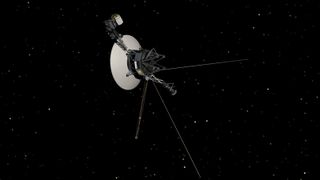what happens to air when it is blown out into space
Lost In Space Without a Spacesuit? Hither'south What Would Happen (Podcast)

Paul Sutter is a research fellow at the Astronomical Observatory of Trieste and visiting scholar at the Ohio Land University'south Center for Cosmology and Astro-Particle Physics. Sutter is too host of the podcasts Ask a Spaceman and RealSpace, and the YouTube series Infinite In Your Face up. He contributed this article to Space.com'south Expert Voices: Op-Ed & Insights.
You've gone and washed it. You lot've institute yourself "spaced": tossed out of the airlock of a capsule or space station without a spacesuit. Panicking, yous badly try to become yourself back to safety. How long do you have to find a source of both air and air pressure level?
Spoiler alarm: not long. Twist ending: longer than you call up.

Blown out of proportion
First off, yous're not going to explode, and your blood'south not going to eddy. Merely because at that place's zero pressure exterior doesn't mean that your torso suddenly loses all cohesion. You may accept noticed a particularly useful organ that covers you from caput to toe — you know, skin. It does a really great job of keeping your insides inside. It'south a little fleck rubberband, but not much, and it's perfectly capable of preventing your guts from spilling out all over space. It also keeps your claret pressure loftier enough to stop your blood from humid. [Our Favorite 'Gravity' Moving picture Moments: Astronauts, Spaceships & Space Junk (Oh, My! )]
Simply but because you won't explode doesn't mean y'all won't inflate. The nitrogen dissolved in your bloodstream about the surface of your pare will collect itself into piddling bubbles. These bubbling expand, puffing you out to around twice your size, starting at your hands and anxiety and moving in. It'southward a existent affair: it'due south chosen ebullism. Sure, you'll look like the worst balloon animal ever, and you'll feel pretty miserable, but y'all won't be dead…at least non right abroad. Left unchecked, the inflated bubbles volition cause pregnant tissue harm, merely other things will kill you lot first.
Spooky out
The temperature — or rather, the lack of temperature — won't become you right away, either. The reason you can get hypothermia and then quickly from lukewarm water isn't the temperature of the water itself, it's that water is actually, really expert at conducting and convecting rut away from you. Any heat your torso's metabolism produces gets sucked away. That's why scuba defined article of clothing wetsuits: to trap a layer of water and prevent it from carrying abroad that precious body heat. In a vacuum, there's no convection — and no conduction, either. That only leaves radiation. Every man is glowing, in the infrared spectrum, from radiating oestrus at near 100 watts. A light bulb used to be the perfect analogy for the free energy output of a person, until we all switched to CFLs and LEDs. But yous nevertheless become the thought. Unremarkably nosotros don't notice all this lost free energy: swaddled in an insulating layer of air, and warmed by the sun above our heads and the ground beneath our anxiety, our thermal output is more than matched by the thermal input of our surround. We can happily radiate all day long. [NASA'south Futuristic Z-two Spacesuit: How Information technology Works (Infographic ) ]
In space there's zip to insulate yous, and so eventually you'll freeze to decease. But fortunately, that loss of 100 watts of heat isn't all that much compared to the sheer mass of your body. You ever notice how long it takes to boil a pan of water, or how long it takes for a pile of snow to melt? In the vacuum of space, you're not turning into a popsicle anytime soon.

What ultimately dooms you is your body's own traitorous circulatory system. In that location's no air in space (it'south kind of part of the definition), which means at that place's no oxygen. Simply your blood doesn't know that. It cycles past your lungs, fix to pick up another O2 hitchhiker, and keeps on going — with or without a passenger. Your center keeps chirapsia, and that oxygen-deprived blood goes wherever it'south supposed to go.
For example, your brain.
Brain drain
Starved of oxygen, your recall-box goes into shutdown manner to conserve energy. About 15 seconds after leaving the safety of the airlock, you lot lose consciousness. Yous're not a corpse all the same, though. If some good (space) Samaritan pulls you back to prophylactic within a minute or ii, you lot'll be all right. Sort of. I hateful, there's all the ebullism and flash-frozen skin. Oh, and a bonus nasty sunburn from all that raw unfiltered UV radiation. Just that's survivable, if a bit uncomfortable.
Unfortunately, if you're left in space past the 2-minute mark, all your other organs will have to shut down from the lack of oxygen likewise, which in medical circles is called "dead."
And for Armstrong's sake, practisenon hold your jiff. I'g no biologist, but I'm pretty sure that the valves and tubes that make up your pharynx were not meant to concord a lungful of atmospheric-pressure air against a pure vacuum. If you try to keep a big breath in, y'all'll feel the same affair that scuba divers practice if they ascend too quickly from deep waters: ruptured lungs.
Gross, I know, merely nobody said spacing would be pretty.
Learn more by listening to the episode "How long could you survive in space without a suit?" on the Enquire a Spaceman podcast, available on iTunes (opens in new tab) and on the Spider web at http://www.askaspaceman.com. Thanks to Adam Diener for the dandy question that inspired this slice. Enquire yours on Twitter using #AskASpaceman or past post-obit @PaulMattSutter.
Follow all of the Skillful Voices issues and debates — and go office of the discussion — on Facebook, Twitter and Google+. The views expressed are those of the author and exercise not necessarily reflect the views of the publisher. This version of the commodity was originally published on Space.com.
Bring together our Space Forums to keep talking space on the latest missions, night sky and more than! And if you lot have a news tip, correction or comment, let united states know at: community@space.com.
Source: https://www.space.com/30066-what-happens-to-unprotected-body-in-outer-space.html
0 Response to "what happens to air when it is blown out into space"
Post a Comment